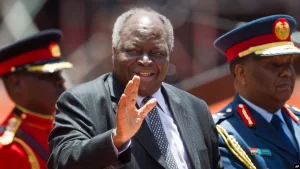 As Kenyans continue to mourn the passing on of Kenya’s third president, Mwai Kibaki, it is time to reflect on his legacy. From the many glowing tributes the late president has received, there is consensus that his presidency was a success. President Kibaki came to power in 2002 through the National Rainbow Coalition (NARC) which brought together opposition leaders with the aim of ending the KANU regime. Realizing that the opposition would lose the 2002 general election if it faced President Moi’s candidate, Uhuru Kenyatta, as a disjointed opposition, President Kibaki crafted an unassailable coalition that helped him romp to the presidency. From then on, coalition building as a vehicle to clinch power has been on the match that has continued to be perfected in each general election cycle.
As Kenyans continue to mourn the passing on of Kenya’s third president, Mwai Kibaki, it is time to reflect on his legacy. From the many glowing tributes the late president has received, there is consensus that his presidency was a success. President Kibaki came to power in 2002 through the National Rainbow Coalition (NARC) which brought together opposition leaders with the aim of ending the KANU regime. Realizing that the opposition would lose the 2002 general election if it faced President Moi’s candidate, Uhuru Kenyatta, as a disjointed opposition, President Kibaki crafted an unassailable coalition that helped him romp to the presidency. From then on, coalition building as a vehicle to clinch power has been on the match that has continued to be perfected in each general election cycle.
When Kibaki became the president, Kenya’s economy was on a downward spiral. Immediately he was inaugurated, President Kibaki instituted reforms that saw the economy bounce back within a short time. It should be noted however, that in addition to his good economic policies, as Kibaki was ascending to power, China had started to emerge as a major capital-intensive investor in Africa. He capitalized on the Chinese government investments in Africa to reengineer the economy with massive successes. As Kibaki was exiting, Kenya’s economy was growing at 6 percent. Kibaki’s economic successes would make Kenyans believe that with political goodwill, Kenya’s economy can grow to rival any economy in the world.
On the political end, Kibaki’s legacy is a mixed bag. In 2007, President Kibaki’s re-election was pyrrhic to say the least. The election was disputed. A dispute that led to widespread violence that saw over 1000 people die, many others injured, and a widespread displacement of people. This is the only time in Kenya’s history that the country came close to a civil war. As dark as this time was, it was also one that Kibaki’s star shone the brightest. Kibaki would enter into an agreement to share power with his opponent, Raila Odinga, thereby ending the violence that was threatening the very existence of the country. This gesture was a first in a region where conflicts have or continue to dismember countries simply because their leaders refuse to resolve disputes through dialogue. The magnanimity of Kibaki and Odinga to use dialogue to solve the post 2007 election dispute has provided a template for resolving national and international disputes.
On constitutional reforms, by the time Kibaki was becaming president, Kenya was already on a constitutional reforms trajectory that one would characterize as a constitutional moment. Kibaki’s predecessor, President Daniel Moi, had accepted multiparty democracy, allowed more media space and the detention of political foes had become a thing of the past. Many Kenyans expected that once Kibaki was in office, he would accelerate the reforms process. Indeed, on the campaign trail, Kibaki promised a new constitution within 300 days. It would not be. Kibaki was a reluctant reformer. However, as fate were, he would be forced by the realities of the post 2007 election violence and the subsequent truce with his opponent to enact the 2010 constitution. The 2010 constitution has been hailed as one of the best in the world.
Interestingly, it is hard to discuss Kibaki’s legacy without that of Raila Odinga. In his first term, Kibaki was supported by Raila Odinga. Odinga’s wing which although did not hold critical power was numerically stronger than that of Kibaki. Odinga’s wing would become the bulwark that tamed the excesses of the Kibaki government. During his second term, Kibaki was in a grand coalition government with Odinga, where Odinga was basically a co-president. Moreover, Odinga’s hand was obvious in most of the reforms Kibaki is credited for. It is therefore impossible to discuss Kibaki’s legacy without Raila Odinga.
Just as history shows that consequential figures bore the embodiment of contradiction and imperfection, so was the late President Kibaki. He had his contradictions and imperfections. Perhaps his lowest moment was the post 2007/08 election violence. Nonetheless, Kibaki’s legacy will be remembered favorably for a thriving economy that he engineered, for the peace accord with Raila Odinga that brought peace to the country, and for the promulgation of the 2010 constitution.
Adjunct Professor
Langston University, USA
